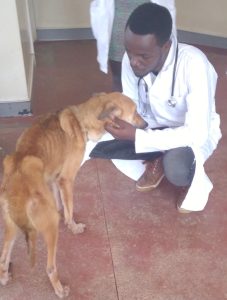Mario, the lady with worm infestation.
Mario, a cherished member of our practice, is a 2.5-year-old female Boerboel residing in Mukono District, Nassuti. She serves as both an indoor guard and a beloved companion. Our team diligently tends to her, ensuring she remains in optimal condition to fulfill her duties. Mario receives regular baths and walks to maintain her wellbeing. Her vaccinations are kept current, administered under the expert guidance of Vetlit mobile veterinary practice. Initially, Mario underwent routine deworming during veterinarian visits. However, due to circumstances, these visits became less frequent over time. As a professional veterinary practice, we kept on encouraging these routine visits regardless.
After a while of missing these routine visits, Mario started losing weight gradually and her appetite started reducing. Mario couldn’t finish half of the food that they routinely used to give her. Later on, Mario started vomiting and passing out bloody diarrhea. At this point, her weight was dropping so fast. This prompted the client to schedule an appointment with us.
Examination of Mario
According to her history, Mario had missed five routine visits. Examination of Mario revealed that she was very dehydrated, anemic, very weak, and very uncomfortable. Her stool was foul-smelling and its quantity was more than normal. Fecal and blood samples were taken for laboratory analysis.
It is important to schedule routine visits. During these, a dog is fully examined, deworming and vaccinations are fully updated. The examination involves a full body checkup, behavioral assessment, nutritional assessment, and environmental assessment. This helps to inform you a lot about your dog. Later this helps you achieve the best results out of your dog. A healthy and good dog is a happy client.

Dr. Isa, Examining a dog that was later diagnosed with helminthiasis.
Diagnosis and treatment
A combination of all the findings revealed that Mario had a big infestation of parasitic worms (helminthiasis). Internally these worms were competing for nutrients with his body. When the nutrients could no longer support their numbers, they resorted to damaging and feeding on his body tissues such as the walls of the digestive system. This explained the later signs such as weight loss, vomiting, and diarrhea.
She was put on supportive treatment to stabilize her condition and curative treatment. After five days of aggressive treatment, Mario was on her road back to good health. Her appetite had greatly improved. Vomiting and diarrhea were no more. She was active and energetic and could enjoy her walks and play. The client was advised to routinely schedule routine appointments for her dog’s safety.
(The picture of Mario isn’t in the pictures used)
Overview of Helminthiasis
Helminthiasis is an infection caused by parasitic worms. The worms that infect dogs include roundworms and tapeworms. These parasites can cause a variety of health problems in dogs, ranging from mild to severe. They usually affect organs such as the stomach, ileum, colon, rectum, liver, heart, etc. in these various organs, these worms compete for nutrients and cause damage or injuries to body tissues.
Symptoms of Helminthiasis in Dogs
Helminthiasis can cause a variety of symptoms in dogs. The severity of symptoms depends on the type of worm and the extent of the infection. Some of the common symptoms of helminthiasis in dogs include:
– Vomiting and diarrhea
– Weight loss and decreased appetite
– Lethargy and fatigue
– Coughing and wheezing
– Itchy skin and fur
– Swollen belly
If you notice any of these symptoms in your dog, it is important to request an appointment as soon as possible. Prompt diagnosis and treatment can greatly improve your dog’s chances of recovery.
Prevention of Helminthiasis in Dogs
Prevention of helminthiasis in dogs involves several measures. Here are some of the steps you can take to protect your dog from worm infections:
– Keep your dog’s living area clean and hygienic
– Do not allow your dog to eat or drink from contaminated sources or eat any dead animals
– Regularly deworm your dog according to the vet’s recommendation
– Practice good personal hygiene; wash your hands after handling dogs and clean up after them, as well
Treatment of Helminthiasis in Dogs
Treatment of helminthiasis in dogs involves several approaches, including medication, surgery, or natural remedies. The vet may prescribe medication for your dog to kill the worms. The goal of the treatment is to remove any existing worms and prevent them from returning. It is important to complete the full course of medication to eliminate all the worms.
Surgery is sometimes necessary when a large number of worms are present. In some cases, the vet may recommend natural remedies that can be used in conjunction with medication to boost your dog’s immune system and help fight off the infection.
